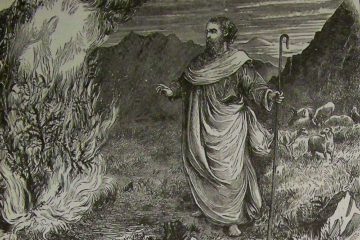Reflection: Bernard of Clairvaux
Sermon Texts
Song of Songs 1:1–8
John 15:7–11
Bernard was a key figure in the medieval church, and was the founder of the Cistercian monastic order. This was one of the first major reforms of Christian monasticism. With Western monasticism, there seems to be a certain economic cycle. A group of religious folk form a community where they withdraw from the world, share their property, and engage in a strict life of prayer and work. And after a few decades or centuries of sharing property and working hard, what happens? You get rich. And when you get rich, you get less strict. So a reform group springs up, separates from the monastery, re-dedicates itself to poverty, hard work and strict observance. And so the cycle repeats. Benard’s Cistercians were a part of this cycle.
Most histories of Bernard focus on his role in various historical events of his day. And if you’re a historian, he is certainly an interesting and influential figure to look in to. But I would like, instead, to highlight his role as a mystic — people are often surprised to hear that an abbot who was an important figure in influencing world events could also be a mystic. But mystics are often more involved in the world than we think.
Bernard represented the force of monastic spirituality that stood in contrast the the scholastic theology that was coming out of the great medieval universities. The universities focused on “scientia” — “knowledge” — and believed that theology should be based on reasoning from one’s knowledge and understanding of scripture and the natural world. Bernard stood in opposition to this. In the monasteries, Bernard promoted practices of scriptural prayer and meditation on scripture — “sacra pagina”, the sacred page — which he believed would lead to a more sound theology. As a result, both scholasticism and mysticism have played, and continue to play, important roles in the development of Christian theology.
Remarkably, Bernard wrote 86 sermons on the Song of Songs — this is remarkable because it is a very short biblical book with only 8 chapters. (In fact, he wrote four sermons on the second verse of the book: “Let him kiss me with the kisses of his mouth!”). But these sermons demonstrate how he could meditate on scripture — often on just tiny snippets and passages — and expound deep theological truths and values. I’d like to close by reading a snippet of his 74th sermon on Song of Songs. This sermon covers several pages, all inspired by a couple of verses in the Song where the two lovers are coyly chasing one another. It describes how Bernard understood the presence of God in his reading of scripture:
I want to tell you of my own experience. … I admit that the Word has also come to me … and has come many times. But although he has come to me, I have never been conscious of the moment of his coming. I perceived his presence, I remembered afterwards that he had been with me. Sometimes I had a presentiment that he would come, but I was never conscious of his coming or his going. …
The coming of the Word was not perceptible to my eyes, for he has no color, nor to my ears, for there was no sound, nor yet to my nostrils, for he mingles with the mind, not the air, … His coming was not tasted by the mouth, for there was no eating or drinking, nor could he be known by the sense of touch, for he is not tangible. …
You ask then how I knew he was present, when his ways can in no way be traced? He is life and power, and as soon as he enters in, he awakens my slumbering soul. He stirs and soothes and pierces my heart, for before it was hard as stone, and diseased. So he has begun to pluck out and destroy, to build up and to plant, to water dry places and illuminate dark ones, to open what was closed and to warm what was cold, to make the crooked straight and the rough places smooth, so that my soul may bless the Lord, and all that is within me may praise his holy name. So when the Bridegroom, the Word, came to me, he never made known his coming by any signs, not by sight, not by sound, not by touch. It was not by any movement of his that I recognized his coming. It was not by any of my senses that I perceived he had penetrated to the depths of my being. Only by the movement of my heart, as I have told you, did I perceive his presence, and I knew the power of his might because my faults were put to flight and my human yearnings brought into subjection. … And when I contemplate all these things I am filled with awe and wonder at his manifold greatness.
As we remember Bernard, let us bear in mind the fact that every one of us has something to add to humanity’s understanding of God. Sometimes we use our intellect, sometimes we use our imagination, sometimes we use our senses, and sometimes we have access to God through God’s own direct revelation. My prayer is that we never try to limit or diminish the many ways in which God is revealed to us.


